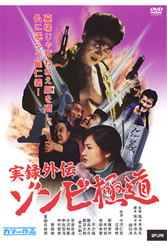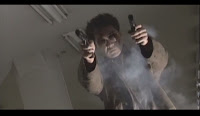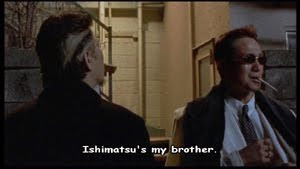The Plot.
In the case of Blood, Nakajo Takuya was a good guy with a good girl back in highschool, when he was attacked by some punks and his girlfriend was raped. His best friend Kamiyama Masayuki (played somewhat blandly by Takachi Noboru, and who looks kinda like Kane Kosugi) saves the day by killing one of the punks with a knife (I'm suddenly having flashbacks to The Outsiders), and the others flee. Takuya can't let his friend take the rap for killing the punk that was raping his girlfriend, so he turns himself in to the police instead, and goes to jail, where he changes his name to Kizaki and apparently became a cold-blooded killer. His old buddy Masayuki, free and clear of the cops, marries Takuya's former girlfriend Yuki, and goes to medical school to become a doctor - which is fortunate for Takuya, since the next time they meet he's dying in an emergency room, only to be saved by his old friend.
It also turns out that the very crime boss that is trying to kill Takuya is also a patient of Masayuki's by the name of Ri, who happens to be dying from terminal bone cancer. Unfortunately for Masayuki and his wife, when the crime boss (played by Hakuryu) finds out that Masayuki and Takuya are old friends, he decides to use this to his advantage, forcing Masayuki to kill Takuya in exchange for the life of his wife.
Very little in this movie stands out. Sure, the script isn't unintelligent or bad, but take a typical Takeuchi Riki straight to video movie, toss in a few stock concepts, sprinkle with an colorful character or two, shake well, and voila.
The Cast and Characters.
Most of the characters are bland, including Masayuki, and Takuya, is well, nearly every B movie character Takeuchi has ever played. And Hakuryu plays the crime boss Ri as simply a serious guy - no over the top craziness that you'd see from Ozawa Hitoshi, for example. My assumption is that Hakuryu downplays everything because this is a man who will be dead in six months from cancer, but it makes for a sort of uninteresting performance. The issues Ri may be wrestling with aren't even really tackled in this movie, so Hakuryu isn't given much to work with anyway. I know Hakuryu has been in many Yakuza films (although none actually come to mind) but this would be one of his less impressive performances.
One standout performance, mainly because it's so over the top is the pinheaded Chinese killer with a perma-grin that works for Ri. Unfortunately I'm at a loss as to who plays him since I can't seem to find it anywhere, but it's one little thing that helps an otherwise dullish movie. Another oddity would have to be the grandma assassin (as in a grandma who is an assassin, not one who kills grandmothers) - I'm not sure why the director chose to put in an old lady assassin, but again, another oddity to help distinguish this movie from others.
It bears mentioning that Sugata Shun also has a small cameo at the end. It also bears mentioning that this would have been a better movie if he had a larger role. As an aside, one actor who definitely was NOT in this movie was Aikawa Sho - even though until I fixed it, IMDB said he was, and quite a few other sites also said he was in it. However, a close look at the DVD case of the American release of Blood shows someone who really does look suspiciously like him. So maybe he's in the director's cut? If anyone knows, let me know.
There are a few good violent scenes, including Takeuchi Riki taking out bad guys First Blood style, and an ending that I suppose wants to be cool, but doesn't quite pull it off. It is vaguely similar to the ending of Yakuza Demon, however not nearly as well done. Which takes us to the violence tally.
The Violent Rundown.
Blood was barely average for violence. It does start out right in the shit with three executions (and one of the victims looks suspiciously like Rokkaku Seiji, who played the chubby Assassin in Takashi Miike's 13 Assassins), and follows with 12 shootings, 2 snapped necks, 6 stabbings, one partial rape, one slashing, 2 strangulations, and someone getting blown up. Like I said, average.
The Final Verdict.
Blood really doesn't offer much more than an uninteresting story with a light dusting of a few interesting characters and a couple scenes of acceptable violence (the coolness meter registers a slight tick, nothing stunning by any means). It is about on par with Tokyo Mafia: Yakuza Wars as far as quality goes, but without the slightly more interesting story and better cast. Blood is a B movie in every way, and only could really appeal to three types of people - Yakuza film fans, Takeuchi Riki fans, and people who just have to see all Japanese movies. Blood is not terrible in the same way that Tokyo Mafia: Yakuza Wars isn't terrible. It will satisfy people who are interested in the subject matter or some aspect of it, but probably won't do much for anyone else. Personally, I didn't hate it, but enjoyed it least of all the movies I've reviewed so far, with the possible exception of Yakuza Zombie. I can barely rank it above Yakuza Zombie as a film, but with a gun in my face and my back to the wall forced to choose, I'll put it just above, mostly because Yakuza Zombie was so much more ridiculous. You can view the trailer for Blood here.
































